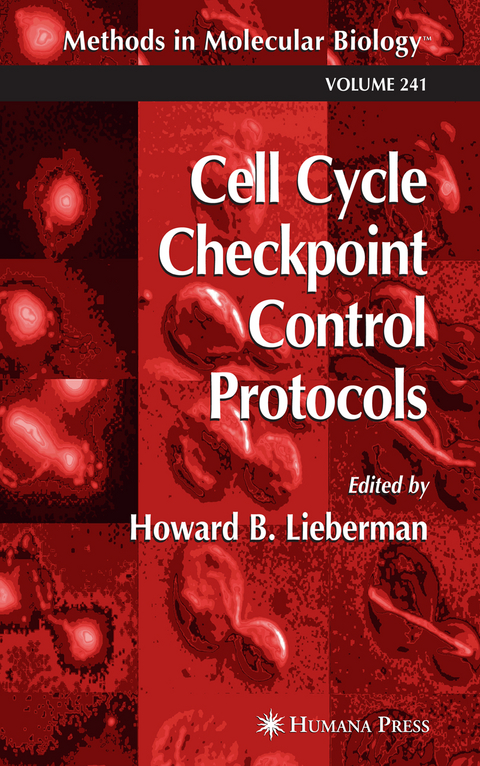
Cell Cycle Checkpoint Control Protocols
Humana Press Inc. (Verlag)
978-1-58829-115-8 (ISBN)
Induction and Detection of Changes in cell Cycle Progression.- Methods to Induce Cell Cycle Checkpoints.- Methods for Synchronizing Mammalian Cells.- Enrichment of Cells in Different Phases of the Cell Cycle by Centrifugal Elutriation.- Analysis of the Mammalian Cell Cycle by Flow Cytometry.- Methods for Detecting Cells in S Phase.- Yeast Cell Synchronization.- Analysis of the Budding Yeast Saccharomyces cerevisiae Cell Cycle by Morphological Criteria and Flow Cytometry.- Analysis of the Fission Yeast Schizosaccharomyces pombe Cell Cycle.- Analysis of Genes Involved in Checkpoint Control.- Strategies to Isolate Evolutionarily Conserved Cell Cycle Regulatory Genes.- Microarray Approaches for Analysis of Cell Cycle Regulatory Genes.- Using the Yeast Genome-Wide Gene-Deletion Collection for Systematic Genetic Screens.- Gene Targeting in Cultured Human Cells.- Use of In Vivo Gap Repair for Isolation of Mutant Alleles of a Checkpoint Gene.- In Vitro Mutagenesis to Define Functional Domains.- Use of Gene Overexpression to Assess Function in Cell Cycle Control.- Histone Acetylation/Deacetylation As a Regulator of Cell Cycle Gene Expression.- Analysis of Proteins Involved in Checkpoint Control.- Cataloging Proteins in Cell Cycle Control.- Multidimensional Proteomic Analysis of Proteolytic Pathways Involved in Cell Cycle Control.- Purification and Identification of Protein Complexes That Control the Cell Cycle.- Xenopus Cell-Free Extracts to Study DNA Damage Checkpoints.- Protein-Protein Interactions.- Detection of Kinase and Phosphatase Activities.- Monitoring Changes in the Subcellular Location of Proteins in S. cerevisiae.- Chromosomes and the Cell Cycle.- Chromosomal Changes and Cell Cycle Checkpoints in Mammalian Cells.- Detecting the Influence of Cell Cycle Regulatory Proteins on Human Telomeres.- Monitoring Spindle Assembly and Disassembly in Yeast by Indirect Immunofluorescence.
"...includes step-by-step instructions written by an investigator who performs it frequently, an introduction explaining the principle behind the method, equipment and reagent lists, and tips on troubleshooting and avoiding known pitfalls." - Tumori
| Erscheint lt. Verlag | 14.11.2003 |
|---|---|
| Reihe/Serie | Methods in Molecular Biology ; 241 |
| Zusatzinfo | XVI, 376 p. |
| Verlagsort | Totowa, NJ |
| Sprache | englisch |
| Maße | 155 x 235 mm |
| Themenwelt | Naturwissenschaften ► Biologie ► Genetik / Molekularbiologie |
| Naturwissenschaften ► Biologie ► Mikrobiologie / Immunologie | |
| Naturwissenschaften ► Biologie ► Zellbiologie | |
| ISBN-10 | 1-58829-115-4 / 1588291154 |
| ISBN-13 | 978-1-58829-115-8 / 9781588291158 |
| Zustand | Neuware |
| Haben Sie eine Frage zum Produkt? |
aus dem Bereich


